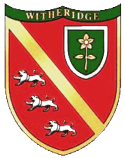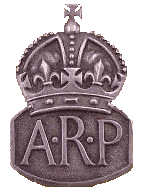

|
In Witheridge, Mr Percy Coles was the Special Constable in charge of blackout. One description has him "lurking about and trying to catch people." E.W. was once caught showing light and was indignant. For a long time, "the church was not blacked out," and the evening service took place in the church room. E.W. recalls that the A.R.P. post was up at Merryside and that the members wore navy blue serge coats. In September 1935, the British Prime Minister, Stanley Baldwin, published a circular entitled Air Raid Precautions (ARP), and invited local authorities to make plans to protect their people in event of a war. Some towns responded by arranging the building of public air raid shelters, these being built of brick with roofs of reinforced concrete, a total of me local authorities chose to ignore the circular, and in April 1937, the government decided to create an Air Raid Wardens Service and during the next year recruited around 200,000 volunteers.
Air Raid Wardens (ARP) were to be the eyes and ears of the local Civil Defence Control Centre, and were responsible for arranged for the sounding of air raid sirens, at which people should immediately take cover before the raid actually started, and sound another when it was safe to leave the air raid shelters. They were also responsible for dealing with unexploded bombs. They evacuate all adjacent premises, and close all roads within a 600-yard radius of the unexploded bomb. They would then inform the Bomb Disposal Unit, and skilled men would arrive to remove the fuse of the bomb. At the beginning of the war, these bombs were not too difficult to deal with. However, in 1940 the German manufacturers began to build in anti-handling devices. The bomb would now explode if anyone attempted to remove the fuse. Members of the Bomb Disposal Unit therefore had the more difficult task of cutting a hole in the casting and removing the explosive contents It was to be the warden's report of any 'incident' that would set the civil defence machine in motion, summoning stretcher parties, fire engines, heavy rescue units and mobile canteens, all the services required to care for the injured, comfort the survivors and dispose of the dead. Initially, the warden was unpopular, with public attitudes ranging from amusement at his funny outfit, flimsy blue overalls and a tin helmet, ideally portrayed by Bill Pertwee in 'Dads Army,' to the active hostility that the English Reserve for those they regard as "interfering state bureaucrats." Previous Last Edited 03/07/2006 Copyright © 2000-2006 Witheridge Unless otherwise indicated on the page in question, the photographic images reproduced on this site belong to the Witheridge Archives, and, as such may not be reproduced for commercial purposes without written permission. However, you are welcome to use any of the photographs belonging to the archive for personal and/or non-commercial use. Any material shown as not being owned by the archive may not be reproduced in any form without first receiving written permission from the owner of the material in question. |



